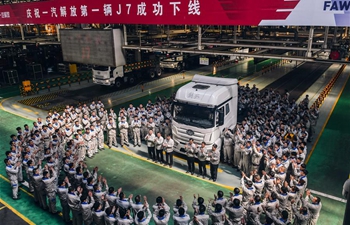LANZHOU, April 18 (Xinhua) -- Lanzhou hand-pulled beef noodles may be the next Chinese street food to win the hearts -- and stomachs -- of foreign foodies.
Zhang Renqian, 18, just finished an important exam that will decide whether he can enroll at a school and gain a management position at a Lanzhou beef noodle restaurant after graduation, either in China or overseas.
"If I pass all the exams, I can get a job," said Zhang, who lives in Jingyuan County in northwest China's Gansu Province.
He is part of a group of 60 applicants vying for 20 places at the International Business School for Lanzhou beef noodle, the first of its kind in Lanzhou, birthplace of the popular handmade noodles.
Established in late January by the Lanzhou Resources and Environment Voc-Tech College and Gansu Jinwei Food Co., Ltd, the school is devoted to training professionals in making authentic Lanzhou beef noodles and bringing them overseas.
With a history of about 200 years, Lanzhou beef noodles consist of a flavorful, clear broth, shaved beef, tender radish slices and chewy handmade noodles. While a bowl of Lanzhou beef noodles can be prepared quickly, the skills needed to pull noodles take years to master.
"A noodle chef can basically learn to pull noodles in a year, and in three years, he can be regarded as a noodle master," said Ma Ting, general manager of Mazilu Lanzhou Beef Noodle Co., Ltd.
There are about 35,000 Lanzhou beef noodle restaurants across China, with total annual revenue hitting 65 billion yuan (10 billion U.S. dollars), according to Ma Limin, chairman of the Lanzhou Beef Noodle Association. The noodles have received a warm response from customers in the United States, Japan, Canada and Australia.
Last August, after a year of study in Lanzhou, Japanese chef Seino Takeru opened a Lanzhou beef noodle restaurant in Tokyo. His diner has been so successful that customers have to wait in line to get a table every day.
A bowl of noodles sells for 880 yen (8 U.S. dollars) at Takeru's restaurant, almost 30 percent more than the price of Japanese ramen, but he can sell more than 300 bowls of noodles within three hours.
But bringing Lanzhou noodles to overseas eaters has been difficult for Chinese businesses as many of their chefs fail to meet visa requirements.
"Many countries such as the United States, Australia and Canada set requirements for basic educational background for a working visa, but most of our noodle chefs are underqualified, so they have been prevented from going overseas," said Shi Ningguo, head of the Lanzhou Resources and Environment Voc-Tech College.
Shi said students at the school will receive three years of training, ranging from noodle-making to hotel management, and will be awarded associate college degrees and national vocational qualification certificates to help them obtain visas.
"The students will learn skills and noodle culture from senior chefs, and those with outstanding performance can spend their second year studying in Australia," said Zhang Wu of the college.
Famous Lanzhou noodle company will also offer the students posts in its overseas branches, with a basic salary of between 8,000 to 12,000 yuan, plus free accommodation.
"We hope these graduates can help Chinese catering businesses go a step further in the near future," said Shi.

















